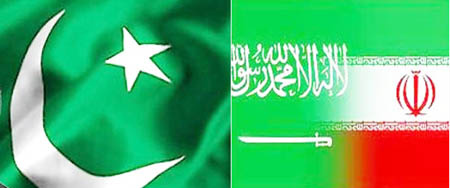When Riyadh provokes Islamabad against Tehran
America's orders or Saudi opportunism

Mohammad Ebrahim Taherian, Iran's former Ambassador to Pakistan, responded to Iranian Diplomacy on the recent Saudi proposal to Pakistan to reconsider its decision with regard to the continuation of cooperation with Iran in the energy sector, which includes the construction of a pipeline between Iran and Pakistan and the import of electricity and oil from Tehran. Saudi Arabia has also expressed readiness to provide Pakistan with a loan for the construction of oil facilities.
Saudi suggestion to Pakistan
In his visit to Islamabad, the Saudi Deputy Foreign Minister suggested to Pakistani officials that they use armaments provided by Saudi Arabia and forsake the energy Iran provides to that country. Some experts believe that it is not yet clear whether the dispute between Islamabad and Tehran is a strategic process in the energy sector or Islamabad views its relations with Iran as instrumental. If we accept that Islamabad's view on cooperation with Tehran in all fields-- including in economy and energy-- is strategic and not instrumental, these measures are of the same nature as those undertaken by Americans, which have not borne fruit. Islamabad should answer the question of whether its view on relations with Tehran is strategic or not. The suspicion that some experts have is more in the context that if Pakistan has an instrumental view, and uses the understanding with Iran in all fields, especially in the energy sector, as an instrument to receive concessions, this method can be exercised in negotiations with Western and Arab countries. In this regard, in the Western world, the United States, and in the Arab world, Saudi Arabia is on the top of the list.
It seems that it is high time for Islamabad to take a clear position on these issues. Whenever Pakistan magnifies this sort of news, one should see whether it wants to charge the Arabs more or whether it wants to get a better bargain from Iran. Bearing in mind all issues related to the foreign policy and economy of Pakistan, this type of behavior will not bear fruit. In other words, these issues have reached a point at which Islamabad should make a strategic decision and avoid tactical moves; otherwise the economy of the country will be worse than its present situation.
Another point which should be taken note of is that in the past and in previous governments, Islamabad had received certain facilities such as loans, low-price energy or long-term pay back of loans. At a juncture during the end of General Musharraf’s government, this trend stopped and discussions regarding Al-Qaeda affected relations between Islamabad, Arabs, and Westerners. Today, we should wait and see whether Saudi Arabia intends to return to its past position and use its past tools to have an impact on the peninsula and Pakistan, or whether it will listen to the advice of Westerners and countries such as the US.
Therefore, two views exist; one being the discussion of whether Pakistan looks at Iran as a tool or not. The second view is that Saudi Arabia is willing to return to its past policies in order to define a more effective role and position for itself, for it has given these kinds of facilities to Islamabad in the past.
Relations between Tehran and Islamabad

